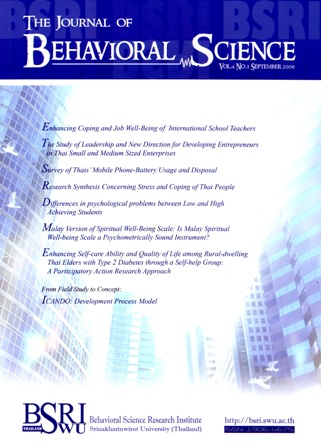The Study of Leadership and New Direction for Developing Entrepreneurs in Thai Small and Medium Sized Enterprises
Main Article Content
Abstract
This research comprised of two phases. The first phase was designed to study the leadership of Thai SMEs entrepreneurs, and the second phase was to develop new leadership through training. In the first phase three sample sets were used. In the first sample set, the data were collected from 30 successful SMEs entrepreneurs using in-depth interview and critical incident technique (CIT). The data were analyzed to generate items of leadership scale for Thai SMEs entrepreneurs. The pilot 120-item leadership scale was tried out on the second sample set that consist of 544 SMEs entrepreneurs. Exploratory factor analysis (EFA) was used to explore the dimensions underlying the leadership scale. Confirmatory factor analysis (CFA) was used as a follow-up to determine the definite number of factors. Six factors resulting from CFA were 1) encouragement through inspirational motivation of subordinates, 2) consideration and well wishing towards others, 3) morality in business, 4) capability of strategic thinking, 5) encouragement of social consciousness, and 6) openness. The final 30-item leadership scale was validated with the third sample set that consisted of 1,064 SMEs entrepreneurs. The known-group technique was used to test the construct validity using the success of the entrepreneurs as the criterion. The results indicated that the leadership scores for all 6 factors from the highly successful SMEs entrepreneurs were statistically higher than the scores from the less successful SMEs entrepreneurs. In the second phase new direction for developing leadership of Thai SME entrepreneurs was proposed through the training course developed Behavioral Science Research Institute Srinakharinwirot University, Thailand from Phase 1. The Training Workshop for Developing SME Entrepreneurs’ Leadership was developed from theories, concepts, research findings, and various documents relevant to leadership development and designing of training course. After development, the training course was reviewed and quality was assessed by a team of experts. There were 3 stages in the training course; that was, assessment before training, leadership development by training, and evaluation after training. The course was organized into 9 modules. After the training, two meetings were held to monitor and evaluate the progress of leadership development plan, to let them share their experiences with each other, to advise them on how to solve the problems during implementing the plan, and to adapt their plan accordingly.


